Philippines travel
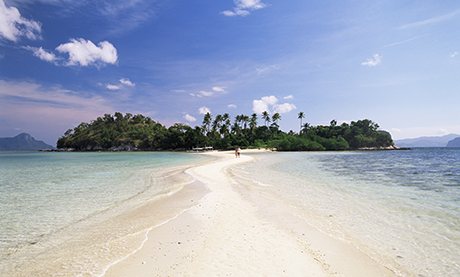
1. Chill out in El Nido, Palawan
This jungle beach town
on the northern tip of Palawan hasn't changed much since before Spanish
colonisation and has been cited as Alex Garland's The Beach. Explore the many
islets of the nearby Bacuit archipelago on a boat-hopping tour, where the water
so clear you can see the fish darting in between coral at 15 metres deep.
Prices range from around £17-£20 per day for a tour and that usually includes
lunch. There is grilled seafood is in abundance across the island.
Palawan was one of the
islands in the path of Typhoon Haiyan, however it was only the city of Coron
and the nearby island communities that were hit. El Nido has not suffered any
damage and the surrounding coral reefs are intact, with only very shallow ones
sustaining damage.
2. Shake your tail feather in Boracay
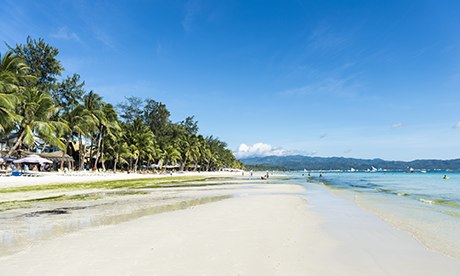
With endless beaches
of powdery-white sand, long happy hours, abundance of restaurants and hotels to
suit all budgets, and plenty of watersports, Boracay is the party island.
It has 12 beaches, the
most popular being White beach and Bulabog. The island is divided up into
"boat stations", which are used a reference points. Station One in
the north is known for its high-end resorts and tranquillity; station two is
the liveliest part, and station three is where all the budget accommodation can
be found. While many locals look back longingly at good old days in the 70s
before the hotels and restaurants started springing up, Boracay is still a
Phuket in its infancy.
There was some storm
damage to the island. Electricity still remains a problem for many parts of the
island, but most hotels are up and running with generators.
3. See a UNESCO World Heritage sight in Banaue, North Luzon
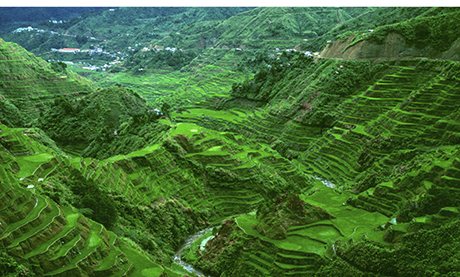
North Luzon, the biggest island of
the Philippines, is a land of
misty mountains, where pines replace palm trees. Head to Banaue and Batad to
admire the 2,000-year-old rice terraces etched along plunging ravines. The
20,000km UNESCO-listed terraces still provide a livelihood for the various
tribal groups that continue to live in relative isolation in the mountains.
Treks along the rice terraces to various villages and waterfalls can be
organised through the Banaue Tourist Information Center.
Expect to pay around £10 for a guide for a whole day.
4. See the curious in Bohol
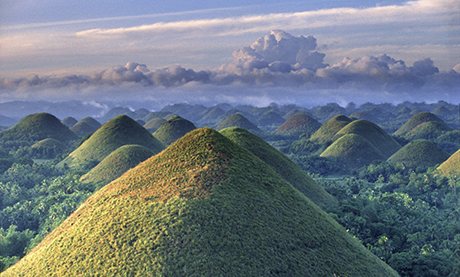
Located just off Cebu, Bohol's most
famous attraction is the surreal Chocolate Hills: over 1,500 mounds formed by
coral deposits sculpted by a millennia of erosion. Depending on the season,
they will either be green or brown. The island's famous resident is the
camera-shy tarsier, the world's smallest monkey. Visit them in their protected
enclosure at the Philippines Tarsier Foundation. Don't visit
them in the cages kept along the river; they are mistreated and don't live long
there. Either hire a motorbike or book a tour from a local company, such as Bohol Travel Tours, for around £35 with
car, guide and lunch.
In October this year, the island
suffered from a 7.2-magnitude earthquake, destroying many houses. Two weeks
afterwards, Bohol was back on its feet, bringing in tourists as normal. The
island was also hit by Typhoon Haiyan, but sustained little damage to its
infrastructure. Tour operators and hotels remain fully open. The main issue
being tackled by the island's authority is limited power supply, which is
slowly but surely getting fixed.
5. Get off the beaten track in Camiguin Island
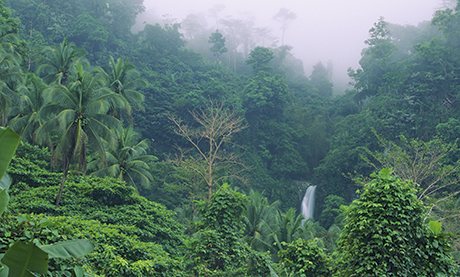
This pear-shaped
volcanic island, just off the northern tip of Mindanao, is often bypassed
because of various Islamist uprisings that have been reported on Mindanoa.
However, Camiguin itself has never had any incidents and those who make the
effort to travel there are rewarded with an island barely touched by tourism.
For such a small landmass, this tiny island packs quite a punch, its 29,187
hectares including seven volcanoes. It also offers good diving through an eerie
sunken cemetery, waterfalls, a lagoon, and hot and cold springs. All of these
can be reached easily by foot, or hire a motorbike(£11 a day with a driver,£7
without).

ไม่มีความคิดเห็น:
แสดงความคิดเห็น